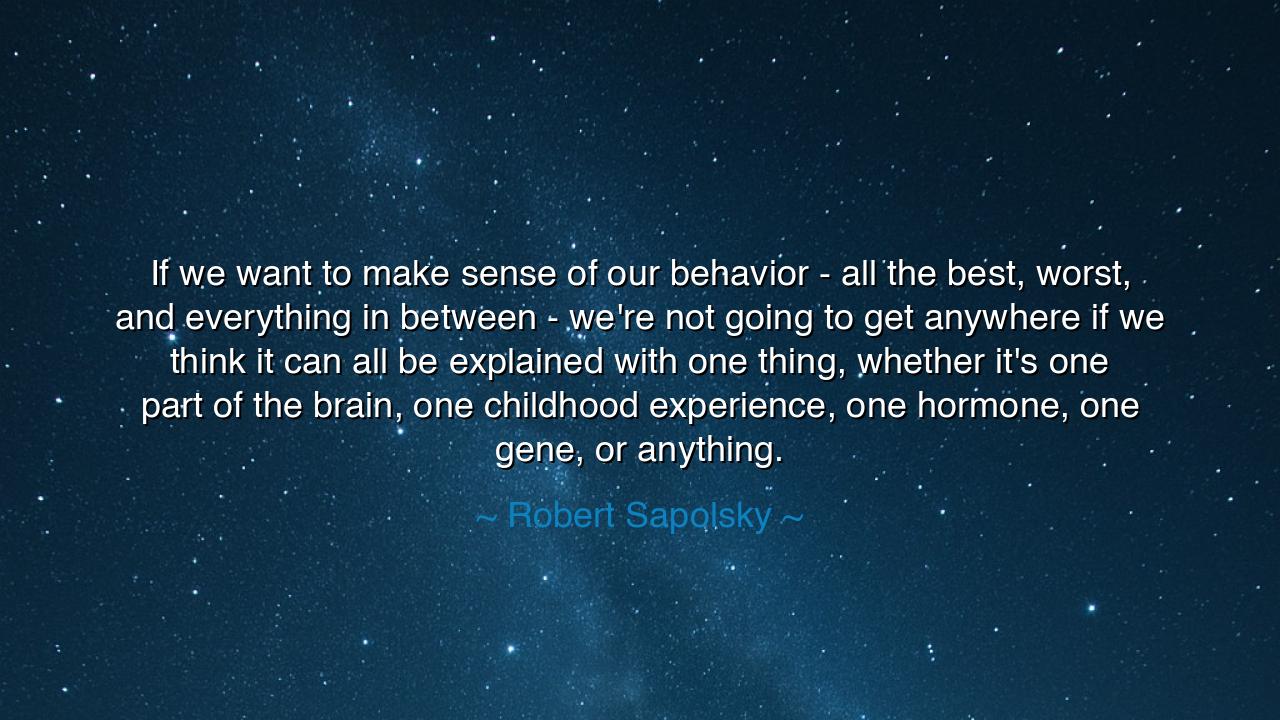
If we want to make sense of our behavior - all the best, worst
If we want to make sense of our behavior - all the best, worst, and everything in between - we're not going to get anywhere if we think it can all be explained with one thing, whether it's one part of the brain, one childhood experience, one hormone, one gene, or anything.






"If we want to make sense of our behavior — all the best, worst, and everything in between — we're not going to get anywhere if we think it can all be explained with one thing, whether it's one part of the brain, one childhood experience, one hormone, one gene, or anything." — thus spoke Robert Sapolsky, the sage of biology and mind, who has spent a lifetime tracing the delicate web that connects the human heart, the body, and the soul. In this wisdom, he calls upon us to abandon the illusion of simplicity, and to embrace the vast complexity that shapes who we are. For the story of human behavior is not written by one author, but by many: by genes and memories, by fears and hopes, by the past and the present, all bound together in the mysterious fabric of life.
Sapolsky’s teaching is not merely scientific; it is philosophical — a reflection on the nature of understanding itself. From the dawn of time, humanity has sought to explain itself in single strokes: “It is the gods,” said the ancients. “It is blood,” said the physicians. “It is the mind,” said the philosophers. But the truth, as Sapolsky reveals, is greater and humbler than any single cause. The human being is a constellation — not one star, but thousands, burning in patterns too intricate for any one answer to capture. To look for a single reason behind our actions is to gaze at a single star and call it the whole sky.
This insight was born from the long and patient study of life itself. Sapolsky, wandering the plains of East Africa, studied baboons — creatures so close to us that their struggles mirror our own. He saw in them rage and tenderness, tyranny and mercy, the echo of both beast and saint. He learned that behavior is not the work of a moment, but the product of a thousand influences: the firing of neurons, the chemistry of stress, the memories of youth, the politics of the tribe, and the unseen hand of evolution. From these lessons he built a truth as ancient as it is modern — that no soul can be reduced to a formula, and no act to a single cause.
Consider, for example, the tale of King Saul from the Scriptures — the first king of Israel, chosen by God and beloved by his people, yet consumed by jealousy and fear until he turned against his own destiny. What made Saul fall? Was it pride? Madness? Fate? Or was it, as Sapolsky might say, all these at once — the convergence of human frailty and divine purpose, of mind, body, and circumstance? To see Saul clearly, we must look beyond judgment and into the complexity of being. For every life, like his, is shaped by countless threads — some chosen, some given, all intertwined.
Sapolsky’s wisdom also carries a warning for our age, when the hunger for simple answers has become both comfort and curse. We live in a time when people say, “It’s the genes,” or, “It’s society,” or, “It’s trauma,” as though one truth could silence all others. But such narrowness blinds the soul. To see humanity clearly, we must learn to hold many truths at once, to walk the delicate line between science and spirit, between the biological and the moral. For understanding requires humility — the humility to say, “I do not know all,” and yet the courage to keep searching.
There is a profound compassion hidden in this way of seeing. If every act, good or evil, arises from countless causes — if the murderer is also shaped by poverty, pain, and chance; if the saint is not only holy but wounded — then judgment must give way to mercy. To understand is to forgive, not because evil ceases to be evil, but because we recognize that every being is a tangle of forces, many beyond their control. This is not to excuse wrongdoing, but to temper justice with empathy, and to see in each life a reflection of our shared complexity.
So let this be the teaching: Do not seek the single cause. When you behold another person — or yourself — resist the hunger for simplicity. Instead, seek to understand the interweaving of forces that brought them to this moment. Listen before you judge; study before you condemn. In your relationships, in your work, even in your own struggles, remember that every heart is a landscape shaped by a thousand winds. The mind, the body, the past, the world — all converge in the mystery of now.
And remember, as Robert Sapolsky teaches, that wisdom begins not in knowing, but in wonder. When you accept the vastness of what shapes human life, you step into awe — awe at the beauty, the sorrow, the unpredictability of being alive. To live with such awareness is to become both scientist and poet, both seeker and servant of truth. So walk gently, my children, through the kingdom of humanity. Look upon others not as puzzles to be solved, but as stories to be heard. For in every soul lies the complexity of creation — and in that complexity, the divine.






AAdministratorAdministrator
Welcome, honored guests. Please leave a comment, we will respond soon